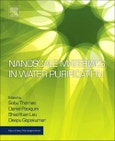Novel nanoscale materials are now an essential part of meeting the current and future needs for clean water, and are at the heart of the development of novel technologies to desalinate water. The unique properties of nanomaterials and their convergence with current treatment technologies present great opportunities to revolutionize water and wastewater treatment. Nanoscale Materials for Water Purification brings together sustainable solutions using novel nanomaterials to alleviate the physical effects of water scarcity.
This book covers a wide range of nanomaterials, including noble metal nanoparticles, magnetic nanoparticles, dendrimers, bioactive nanoparticles, polysaccharidebased nanoparticles, nanocatalysts, and redox nanoparticles for water purification. Significant properties and characterization methods of nanomaterials such as surface morphology, mechanical properties, and adsorption capacities are also investigated
Please Note: This is an On Demand product, delivery may take up to 11 working days after payment has been received.
Table of Contents
Introduction for nanomaterials :-state of art, new challenges and opportunities Sabu Thomas, Daniel Pasiquini, Shao-Yuan Leu and Deepu Ambika Gopakumar 1. Nanocellulose based membranes for water purification Deepu Ambika Gopakumar, Daniel Pasiquini, Sabu Thomas and Shao-Yuan Leu 2. Polymer /carbon Nanotubes Mixed Matrix membranes for water purification Mohammad Hossein Davood Abadi Farahani Vahid Vatanpour 3. Dendritic Polymer Enhanced Ultrafiltration Michael Arkas 4. Development of Mixed Matrix Membranes: Incorporation of Metallic Nanoparticles in Polymeric membranes Jorge Garcia-Ivars 5. Water Treatment by Molecularly Imprinted Materials Costas Kiparissides 6. ElectrospunNanofibrous Filtration Membranes Irene Bonadies 7. Electrospinning: A versatile fabrication technique for nanofibrous membranes for use in desalination Shiao-Shing Chen 8. Electrospun Nanofibrous Filtration Membranes for Heavy metals and dyes removal Pratima Solanki 9. Electrospinning: A fiber fabrication technique for water purification Maria Wasim, Aneela Sabir and Tahir Jamil 10. Carbon Nanotubes Based Membranes for water purification Jieun Lee 11. Carbon Nanotubes for Advancing Separation Membranes Xuan Zhang 12. Carbon Nanotube and Grapheme oxide Based Membranes Aneela Sabir and Tahir Jamil 13. Graphene-based materials for water purification Alireza Khataee 14. Iron oxide nanomaterials for water purification Andrews Grace 15. Iron oxide nanomaterials for the removal of heavy metals and dyes from waste water Mubarak Mujawar 16. Magnetic metal/metal oxide nanoparticles and their nanocomposites material for the removal of the water pollutants Manash Ranjan Das Sr. 17. Surface modifiications of Magnetic nanoparticles for water purification Luís Carlos de Morais 18. Magnetic nanoparticles for water purification Konstantinos Simeonidis 19. Noble metal nanoparticles for water purification Ewa Kowalska 20. Semiconductor Photocatalysis for water purification Carolina Belver 21. Recent advances in Photocatalytic Detoxification of water Suresh Pillai 22. Semiconductor photocatalysis for water purification Youji Li Sr. 23. Nanoscale Materials for Arsenic Removal from Water Abhijit Maiti 24. Challenges and opportunities of Graphene-based materials in current desalination and water purification technologies Shadi W. Hasan








